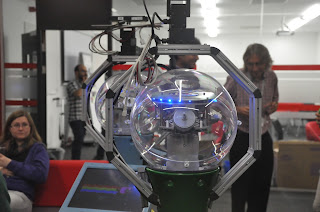From 27th August to 31st August 2015, the
STRANDS project organised the first "Summer School on Long-term Autonomy for Mobile Robots" (LAMoR) at the
University of Lincoln, UK; co-located with the
European Conference on Mobile Robots. 25 participants from all over Europe, selected from 49 applications following a rigorous review process, enjoyed exciting days of engaging research talks by STRANDS academics, robot hacking, networking among peers, and shared hands-on experience from the STRANDS robot practitioners. The summer school addressed a variety of topics, covering most of the research areas of STRANDS, such as
- Long-term mapping & Robust navigation
- Person Perception and Activity Understanding
- Computer Vision for Robots
- Scheduling Long-term Autonomy
The school was composed of morning research presentations, followed by hands-on programming tutorials and exercises. Participants were then working in teams with one of four STRANDS robots each, made available for the summer school by the project consortium. Participants used the
released software packages of the STRANDS project to implement four new robotic systems that were all successfully demonstrated and autonomously operating at the
Welcome Reception of ECMR to more than 70 international researchers attending the conference. Applications developed on the robots by the participants ranged from robots that approached people to cheer them up telling jokes and
tweeting their photo, an
emotional robot that visitors could punish or pet, up to a robot that could re-identify participants by analysing their conference badges using computer vision techniques.
 |
A robot identifying
conference badges |
All the materials of the summer school are made publicly available on the project's GitHub repository, including the
lecture slides and tutorials. These tutorials serve as an excellent starting point for anybody who is keen to use the software developed (usually
ROS components) by the STRANDS project, which is all easily accessible, released as
Ubuntu binary packages for installation within minutes. The consortium is very proud that 25 excellent early-career researchers were able to develop their own robotic systems with the software and tutorials provided in just four days of programming - from concept all the way to a robustly working system.
A lot of this excitement is shared by the participants, indicated in their shared their experience on
Twitter and in their feedback:
...The fact that we could use the robots for the summer school was really awesome, thanks for setting up the software so everything ran more-or-less seamlessly...
... I just had a life time experience and great motivations for my future study and work...
...I greatly enjoyed the course and feel I have taken a great deal away from it and grown as a researcher as a result...
The consortium says thank you to all the extremely motivated researchers that made this event a great success.






No comments:
Post a Comment